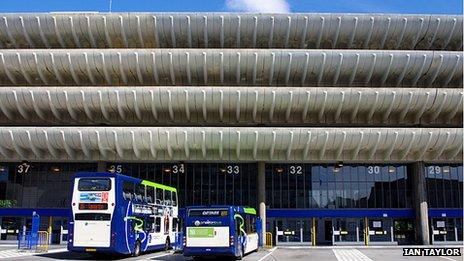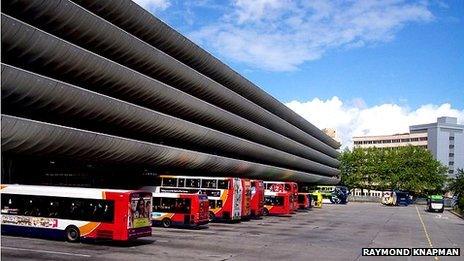Preston Bus Station given Grade II listed status
- Published

Preston City Council says the bus station does not offer value for money
Preston's under-threat bus station has been given Grade II listed status by the government.
Preston City Council wants to demolish the station, saying it would cost more than £17m to modernise.
Its leader, Peter Rankin, said news of the listing was "not the outcome we were hoping for".
But campaigners welcomed the decision taken by Ed Vaizey, the Minister for Culture, saying it was "brilliant news".
English Heritage said the Grade II listing would not prevent changes being made to the building, provided its architectural significance was protected.
Councillors say it costs £300,000 a year to run the bus station and the estimated cost of getting it up to "modern-day standards" would be between £17m and £23m.
'Savvy architecture minister'
Labour councillor Mr Rankin said: "We've always said the bus station is too big, provides relatively poor facilities for bus passengers and costs Preston taxpayers over £300,000 a year to maintain.
"We will have to take some time now to consider the listing decision and the options for moving forward.
"We need to look at costs and the impact on budgets and how it affects Preston taxpayers.
"We will work closely with Lancashire County Council as transport authority to consider the next steps."
The Royal Institute of British Architects Journal, which has backed a campaign to save the building, posted a message on Twitter, saying: "Well done to all campaigners."

The building has nine levels and 1,100 car park spaces
Journal Editor Hugh Pearman added: "Ed Vaizey, you are a star. Our very savvy architecture minister has listed the wonderful Preston Bus Station."
'Ingenuity of design'
A spokeswoman for English Heritage said the building "fully deserves this marker of recognition".
"Preston Bus Station is truly remarkable," she said.
"The boldness of vision, the ingenuity of the design, the attention to detail and the aesthetic impact mark it out from the vast numbers of public buildings built since the Second World War.
"We are aware that Preston City Council faces challenges in maintaining the structure and integrating it effectively with the city centre and that, as a result, it has decided it wishes to demolish it.
"We will, however, continue to explore with the council how these challenges can be addressed so that the building can once again play a key role in the life of the city."
Built in the 1960s, the bus station is seen as a prime example of the Brutalist school of architecture.
- Published21 March 2013
- Published15 March 2013
- Published12 March 2013
- Published12 February 2013
- Published18 December 2012
- Published17 December 2012
- Published7 December 2012
- Published4 November 2011
- Published5 October 2011